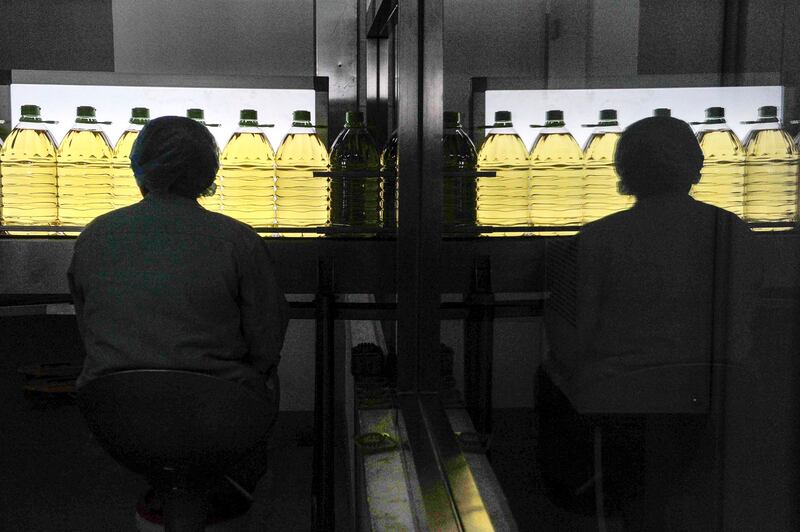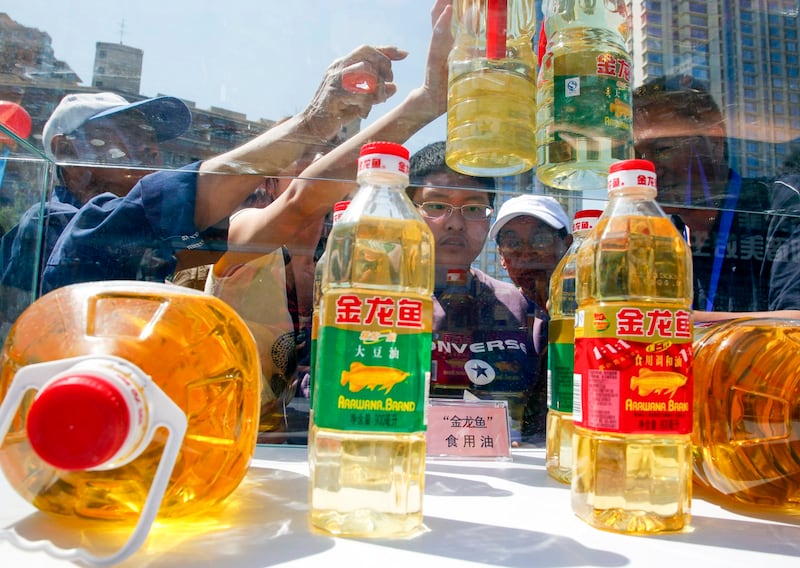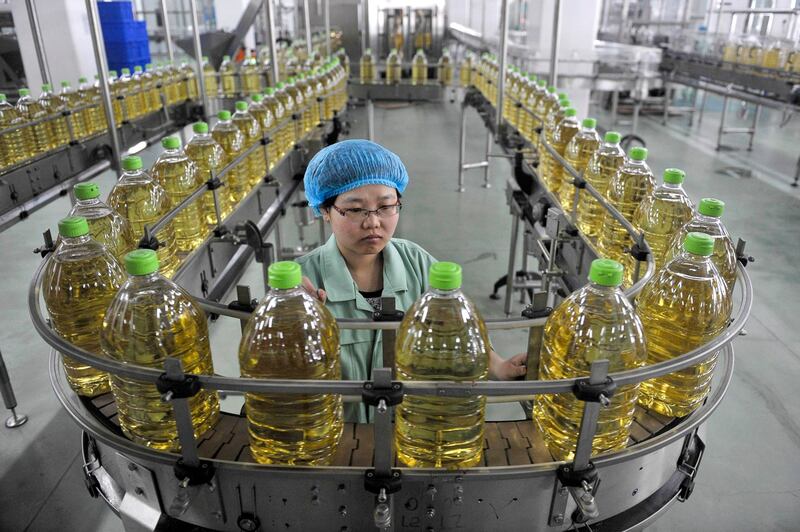Shoppers in China are rushing to buy artisanal cooking oils after the government announced a top-level probe into food safety amid reports that tankers previously used to haul industrial chemicals had been repurposed for cooking oil – without cleaning.
Video clips posted by social media users in the central province of Henan showed people rushing to buy imported oils and hand-pressed oils at the Pangdonglai Supermarket chain, with pressed peanut oil sold out by July 10 at the Times Square branch in Xuchang city.
"Peanut oil has sold out, and the sunflower oil only lasted a few hours, and now they're going to be out of stock for a week," one shopper said in a social media video clip reposted by the citizen journalist “Mr Li is not your teacher” to X.
"People are lining up at Pangdonglai to buy its pressed cooking oils, which have just arrived," said another. "Here we have Pangdonglai brand pressed peanut oil, and here we have its pressed sunflower oil."

Liu Li, a resident of Henan's Zhengzhou city, said many people now prefer to buy their oil from smaller factories selling pressed oils.
"The oil made by smaller companies is actually pretty healthy, and environmentally friendly," Liu told RFA Mandarin in an interview on Friday.
Other shoppers scrambled to buy oil presses to make their own cooking oil at home, with more than 1,600 posts visible on Xiaohongshu on Friday on the topic of home-pressed oil.
Some people said they'd travel to Hong Kong to get their cooking oil.
"Later, I'm gonna be taking the subway to Hong Kong to get cooking oil," wrote one comment on Douyin, with similar comments appearing on Xiaohongshu.
Read other China panic buying stories
[ Beijing’s protests over Fukushima water release spark panic-buying of saltOpens in new window ]
[ Panic-buying hits Beijing as residents brace for wider lockdownsOpens in new window ]
[ Milk row sparks visa ban callsOpens in new window ]
Rumors of kerosene
A resident of the southern city of Dongguan, just across the internal border from Hong Kong, who gave only the surname Mai for fear of reprisals said rumors are spreading of "kerosene" in industrially produced cooking oils.
"Of course I'm worried," Mai said. "Who isn't?"
The rush to find "clean" cooking oil comes after the Food Safety Office of the State Council launched a probe on July 9 in response to a report in the Beijing News, warning that "companies acting illegally and persons responsible will be severely punished in accordance with the law."
The Beijing News reported in an undercover investigation earlier this week that it was an "open secret" in the transportation industry that tankers that once contained petrochemical products were being used to transport cooking oil without being cleaned first.
China has stringent regulations in place for the cleaning of tankers used to transport edible oils, but they don't appear to be being widely followed, the report found.

"Generally, the tank doesn't get washed," one driver told a Chinese media outlet as the scandal broke. "It'll be fine as long as they don't get inspected."
"Usually they will just look at the two openings and give them a wipe," the driver said. "The smaller factories don't care, and don't even look at it."
The newspaper quoted China Agricultural University food science professor Zhu Yi as saying that petrochemical products could be poisonous to humans and cause damage to their respiratory and digestive systems.
U.S.-based journalist Wang Jian said China is no stranger to food safety scandals, and blamed a "moral decline" in the food and transportation sectors.
Wang said it remains to be seen whether or not the State Council investigation will yield any kind of meaningful change.
Infant formula panic
Two companies named in the Beijing News report, Hopefull Grain and Oil Group and Sinograin have announced internal probes of their own since the report was published.
Other edible oil companies including Luhua and Jinlongyu have also issued statements saying that they only transport their products in food-grade tankers, while Xiwang Food said it doesn't use tankers at all, Hong Kong's Ta Kung Pao newspaper reported on July 10.
It was unclear whether large numbers of people have started traveling to Hong Kong to buy oil, as they did to bulk buy infant formula during the tainted milk powder scandal.
Tainted milk campaigner Guo Li said little has changed in China’s food safety record since hundreds of infants were sickened or died due to melamine contamination of infant milk formula products.
“They keep issuing bans, but the same stuff keeps on happening regardless,” Guo told RFA Mandarin on Friday. “The Food Safety Law and other laws and regulations aren’t strictly enforced.”

Current affairs commentator Johnny Lau said authorities in Hong Kong were unlikely to discourage them.
"They want to attract people across the border to spend money in Hong Kong," Lau said. "So the Hong Kong government won't stop them, even if they're buying up something that is in short supply in Hong Kong."
In 2013, authorities in Hong Kong set a limit on the number of cans of infant formula milk a person could buy after residents of mainland China flocked across the border in search of imported milk powder to feed their infants during a fake milk powder scandal that year.
The mass-buying led to shortages of infant formula, and sparked angry protests and confrontations between Hong Kong residents and mainland Chinese, many of whom were alleged to be wholesalers trying to profit from the scandal, rather than parents looking for safer milk to feed their children.
Translated by Luisetta Mudie.
